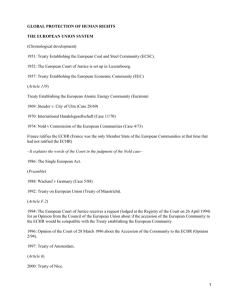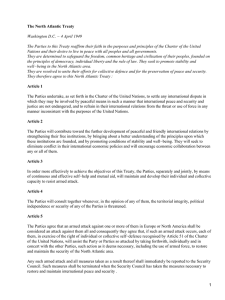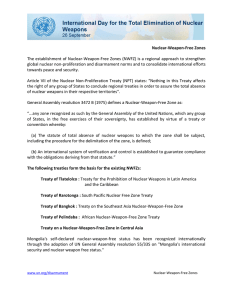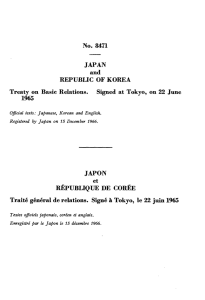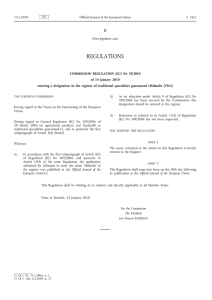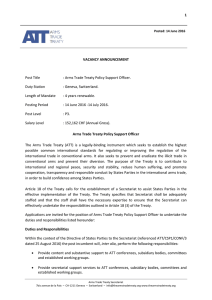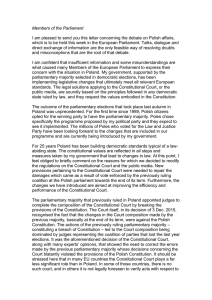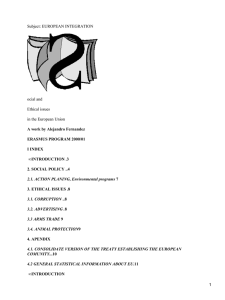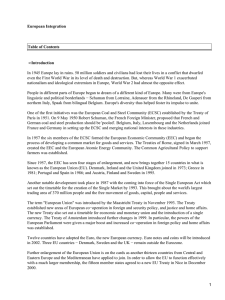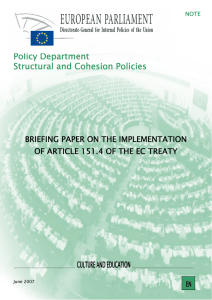Decision
Anuncio
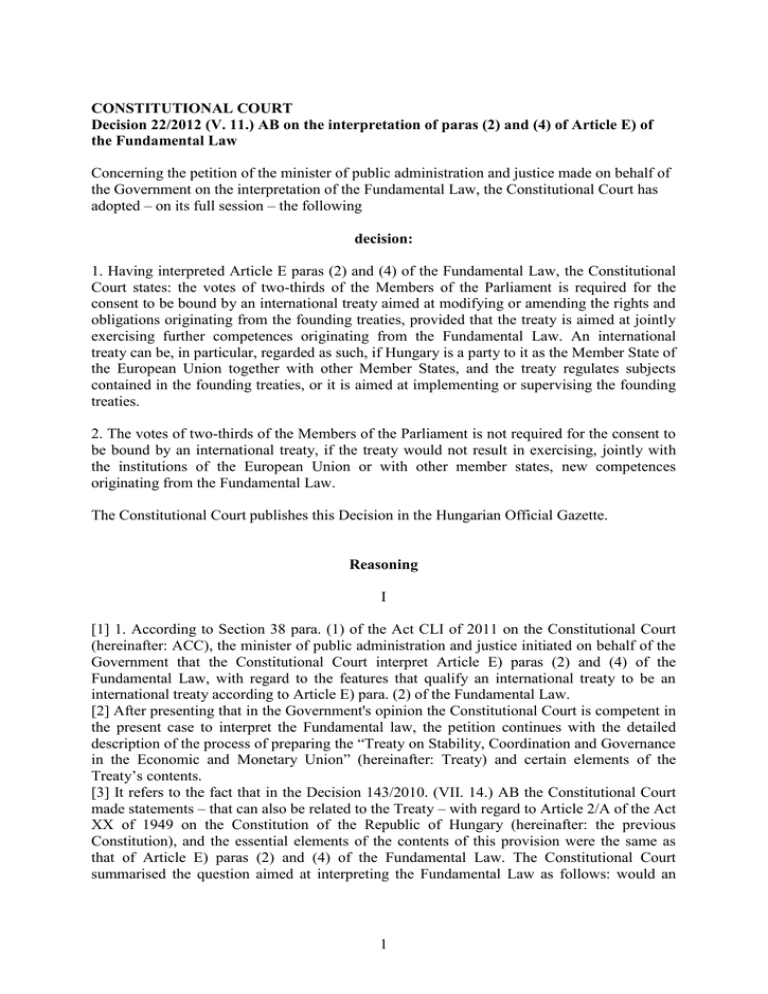
CONSTITUTIONAL COURT Decision 22/2012 (V. 11.) AB on the interpretation of paras (2) and (4) of Article E) of the Fundamental Law Concerning the petition of the minister of public administration and justice made on behalf of the Government on the interpretation of the Fundamental Law, the Constitutional Court has adopted – on its full session – the following decision: 1. Having interpreted Article E paras (2) and (4) of the Fundamental Law, the Constitutional Court states: the votes of two-thirds of the Members of the Parliament is required for the consent to be bound by an international treaty aimed at modifying or amending the rights and obligations originating from the founding treaties, provided that the treaty is aimed at jointly exercising further competences originating from the Fundamental Law. An international treaty can be, in particular, regarded as such, if Hungary is a party to it as the Member State of the European Union together with other Member States, and the treaty regulates subjects contained in the founding treaties, or it is aimed at implementing or supervising the founding treaties. 2. The votes of two-thirds of the Members of the Parliament is not required for the consent to be bound by an international treaty, if the treaty would not result in exercising, jointly with the institutions of the European Union or with other member states, new competences originating from the Fundamental Law. The Constitutional Court publishes this Decision in the Hungarian Official Gazette. Reasoning I [1] 1. According to Section 38 para. (1) of the Act CLI of 2011 on the Constitutional Court (hereinafter: ACC), the minister of public administration and justice initiated on behalf of the Government that the Constitutional Court interpret Article E) paras (2) and (4) of the Fundamental Law, with regard to the features that qualify an international treaty to be an international treaty according to Article E) para. (2) of the Fundamental Law. [2] After presenting that in the Government's opinion the Constitutional Court is competent in the present case to interpret the Fundamental law, the petition continues with the detailed description of the process of preparing the “Treaty on Stability, Coordination and Governance in the Economic and Monetary Union” (hereinafter: Treaty) and certain elements of the Treaty’s contents. [3] It refers to the fact that in the Decision 143/2010. (VII. 14.) AB the Constitutional Court made statements – that can also be related to the Treaty – with regard to Article 2/A of the Act XX of 1949 on the Constitution of the Republic of Hungary (hereinafter: the previous Constitution), and the essential elements of the contents of this provision were the same as that of Article E) paras (2) and (4) of the Fundamental Law. The Constitutional Court summarised the question aimed at interpreting the Fundamental Law as follows: would an 1 international treaty be regarded as an international treaty under Article E) para. (2) of the Fundamental Law if [4] a) it is not one of the founding treaties of the European Union, and it is not a legal act of the Union, but [5] b) all of its states parties are member states of the European Union, [6] c) which regulates subjects that are also regulated by the founding treaties of the European Union and by the legal acts of the Union, [7] d) which is aimed at the further development of the European Union and strengthening the economy of the European Union in a subject matter, which is an essential element of the European Union's founding treaties, and [8] e) according to which certain institutions of the European Union can act in implementing and supervising the implementation of the international treaty? [9] The Constitutional Court examined the questions on interpreting the Fundamental Law, according to the contents of the questions. [10] 2. According to the petition, the preparation process of the Treaty – which the cause of this petition is – included an agreement concluded by the heads of States and heads of governments of the euro-zone Member States of the European Union, on the session of the European Council held in Brussels on 8-9 December 2011, on the elaboration of an international treaty for the purpose of managing the new challenges caused by the economic crisis and affecting the euro-zone, aimed at strengthening the budgetary discipline and the coordination of economic policy, and the creation of a stronger economic union through the introduction of more automatic sanctions. The president of the European Council sent the first draft of the Treaty to the Member States on 16 December 2011. The Treaty was prepared in December 2011 and January 2012 in an ad hoc working group with the participation of all Member States of the Union. The negotiation about the Treaty prepared in the working group was concluded on 30 January 2012 at the meeting of the heads of States and heads of governments where the Treaty was adopted. The Treaty was signed, with the adoption of its final text, on the European Council’s meeting of 1-2 March 2012. [11] Regarding certain elements of the Treaty's contents, the petition underlines that the Member States of the European Union can be the States parties to the Treaty. The provisions of the Treaty are applicable after taking force to those Member States of the European Union ratifying the Treaty that are members of the euro-zone. With regard to non euro-zone Member States of the European Union ratifying the Treaty – until they become members of the eurozone –, it shall only be applicable, with the exception of title V, in the case, and in the scope, of those provisions in connection with the ratifying Member State has expressly declared undertakings in advance. The petition points out that Hungary is, at the present, not a member of the euro-zone, but at the same time, independently from the above, ratifying the Treaty by Hungary – even in the absence of a specific declaration of undertaking made in advance, and also beyond the scope of title V – results in an obligation of Hungary under international law. This obligation under the international law is conditional, as the date of its effect depends on when the Council decides, on the basis of Article 140 para. (2) of the Treaty on the Functioning of the European Union (hereinafter: TFEU), on eliminating the derogation under Article 139 para. (1) of TFEU, causing to acknowledge Hungary as a member of the eurozone. II [12] 1. The relevant regulation of the Fundamental Law: [13] “Article E) 2 [14] (1) In order to achieve the highest possible measure of freedom, well-being and security for the peoples of Europe Hungary shall contribute to the achievement of European unity. [15] (2) In order to participate in the European Union as a Member State, and on the basis of an international treaty, Hungary may, to the extent necessary to exercise the rights and fulfil the obligations set out in the founding treaties, exercise some of its competences deriving from the Fundamental Law jointly with other Member States, through the institutions of the European Union. [16] (3) The law of the European Union may stipulate generally binding rules of conduct subject to the conditions set out in paragraph (2). [17] (4) The authorisation for expressing consent to be bound by an international treaty referred to in paragraph (2) shall require the votes of two-thirds of all Members of Parliament. III [18] 1.1. Article 24 para. (2) items a)−g) of the Fundamental Law regulate the competence of the Constitutional Court. Article 24 of the Fundamental Law does not contain any competence of the Constitutional Court on interpreting the provisions of the Fundamental Law, but at the same time, according to Article 24 para. (2) item g), a cardinal Act may establish further duties and competences. [19] Chapter II Title 16 of ACC is on the interpretation of the Fundamental Law. According to Section 38 para. (1), “on the petition of Parliament or its standing committee, the President of the Republic or the Government, the Constitutional Court shall provide an interpretation of the provisions of the Fundamental Law regarding a certain constitutional issue, provided that the interpretation can be directly deduced from the Fundamental Law.” [20] Based on the normative text of ACC, only specific organisations (persons) are entitled to initiate the interpretation of the Fundamental Law, and they can only do it in a petition with a specific content, under the conditions regulated in ACC. [21] Therefore the Constitutional Court had to examine whether the petition was [22] a) submitted by a body or a person specified in Section 38 para. (1) of ACC, [23] b) related to the interpretation of a concrete provision of the Fundamental Law, [24] c) related to a concrete problem of constitutional law, and finally [25] d) whether the interpretation was directly deductible from the Fundamental Law. [26] Act XXXII of 1989 on the Constitutional Court (hereinafter: the previous ACC), in force until 31 December 2011, also contained a scope of competence on interpreting the Constitution. [27] As expressly stated in the reasoning attached to Section 38 of ACC, it was the intention of the legislator to maintain the Constitutional Court's former competence aimed at interpreting the Constitution. The wording of Section 38 para. (1) of ACC is similar to the criteria elaborated in the course of the former judicial practice of the Constitutional Court on the interpretation of the Constitution, on the basis of Section 1 item g) and Section 51 of the old ACC, before the Fundamental Law was put into force. [28] [According to the former standing practice of the Constitutional Court – first: Decision 31/1990 (XII. 18.) AB, ABH 1990, 136, 137−138 – the following criteria are to be taken into account in case of an initiative for the theoretical interpretation of the Constitution: The petition shall originate from a person entitled to file a petition; the procedure shall be initiated not in general terms but in the aspect of a concrete problem of constitutional law; it shall ask for the interpretation of a concrete provision of the Constitution. Finally, the specific problem 3 in constitutional law shall be derived directly from the Constitution, without the interposition of another legal rule.] [29] 1.2. a) The petition was filed on behalf of the Government by the minister of public administration and justice, i.e. it was submitted by a person entitled to do so. [30] b) The petition is aimed at interpreting Article E paras (2) and (4) of the Fundamental Law, i.e. specific provisions of the Fundamental Law. [31] c) The petition contains a concrete problem of constitutional law, as follows: [32] The president of the European Council sent the first draft of the Treaty to the Member States on 16 December 2011. The negotiations about the Treaty were concluded on 30 January 2012 at the meeting of the heads of States and heads of governments where the Treaty was adopted. The Treaty was signed, with the adoption of its final text, on the European Council’s meeting of 1−2 March 2012. Then the ratification procedures necessary for acknowledging the mandatory force of the Treaty can be started by the Member States. [33] The Treaty – as pointed out in the petition – regulates in many different contexts the application of certain legal and institutional mechanisms of the European Union, and the role of the institutions of the European Union in monitoring, supervising and enforcing the implementation of the Treaty, and in the consultation and the coordination with the Member States. Although the subject of the Treaty is not about Hungary being a Member State of the European Union or not, and neither is it a founding treaty, a question emerges concerning the interpretation of paragraph (2) of Article E) of the Fundamental Law and the application of paragraph (4) thereof, with regard to the authorization given in the respect of acknowledging the mandatory force of it. [34] d) The interpretation question about the cases and the conditions related to the application of Article E) paras (2) and (4) of the Fundamental Law can be deducted directly from the Fundamental Law by way of interpreting these regulations. [35] 2. Regarding Article 2/A of the previous Constitution, the petition quotes and interprets in details the Constitutional Court's Decision 143/2010. (VII. 14.) AB. As claimed in the petition, “the term “on the basis of an international treaty” in Article 2/A para. (1) [...] can be interpreted not only in the context of the so called accession treaty, but as a logical consequence of it, if, in the course of the further development of the European Union, it seems that the exercising – in a “joint” way or “by way of the institutions of the European Union” – of other competences originating from the Constitution becomes necessary, then the transfer of such competences [...] is possible [...] on the basis of another international treaty. This way, the legislative power – under the supervision of the Government engaged in the negotiations, and in the course of the so called ratification procedure –, exercising the State’s sovereignty, decides about accepting, on behalf the Republic of Hungary, [...] a complex institutional reform. Article 2/A para. (2) requires voting with a two-thirds majority, taking into account the importance of the question." [ABH 2010, 698, 705.] [36] According to the petition, Article E) paras (2) and (4) essentially have the same content as Article 2/A of the previous Constitution. [37] This is why the Constitutional Court has to examine on the basis of the petition whether the statements made in above mentioned decision interpreting Article 2/A of the previous Constitution can be applied in the course of judging upon the present petition. 4 [38] 3.1. The previous Constitution was put out of force as from 1 January 2012 by Article 31 para. (3) of the "transitory provisions of the Fundamental Law of Hungary". [39] The previous Constitution is replaced by the Fundamental Law. The Parliament adopted the Fundamental Law – as stated in point 2 of its closing provisions – according to Section 19 para. (3) item a) and Section 24 para. (3) of Act XX of 1949. In line with Article 8 of the transitory provisions of the Fundamental Law of Hungary, putting the Fundamental Law into effect has not affected – with the specified exceptions – the mandate of the Parliament, the Government, the assemblies of the representatives of local governments, and of the persons appointed or elected before the Fundamental Law was put into force. [40] The Constitutional Court’s duty is the protection of the Fundamental Law. The Constitutional Court can apply in the new cases the arguments connected to the questions of constitutional law judged upon in the past and contained in its decisions adopted before the Fundamental Law was put into force, provided that it is possible on the basis of the concrete provisions – having the same or similar content as that of the previous Constitution – and of the rules of interpretation of the Fundamental Law. [41] Performing its specific competences, the Constitutional Court interprets the constitution, even if it is not an abstract one as in the competence under Section 38 para. (1) of ACC, and it is related to the examination of a statute or a judicial decision. The Constitutional Court’s interpretation of certain institutions, principles and provisions can be found in its decisions. The Constitutional Court’s statements made on the fundamental values, human rights and freedoms and on the constitutional institutions that have not been changed fundamentally by the Fundamental Law remain valid. The principal statements expressed in the Constitutional Court’s decisions based on the previous Constitution shall remain applicable as appropriate also in the decisions interpreting the Fundamental Law. However, the statements made in the decisions based on the previous Constitution cannot be taken over automatically without any examination; the provisions of the previous Constitution and of the Fundamental Law have to be compared and carefully weighed. If the comparison results in establishing that the constitutional regulation has not been changed or it is essentially similar to the previous one, then the interpretation can be transposed. On the other hand, when the contents of the provisions of the previous Constitution and of the Fundamental Law are the same, the reasoning is required for not taking into account the legal principles presented in the former decisions of the Constitutional Court, and not in the case of applying them. [42] 3.2. According to Article 2/A para. (1) of the former Constitution, “by virtue of treaty, the Republic of Hungary, in its capacity as a Member State of the European Union, may exercise certain constitutional powers jointly with other Member States to the extent necessary in connection with the rights and obligations conferred by the treaties on the foundation of the European Union and the European Communities (hereinafter referred to as "European Union”); these powers may be exercised independently and by way of the institutions of the European Union.” [43] It was stated in paragraph (2) that “the ratification and promulgation of the treaty referred to in paragraph (1) shall be subject to a two-thirds majority vote of the Parliament.” [44] Article E) para. (2) contains a provision identical with that of Article 2/A, establishing that “in order to participate in the European Union as a Member State, and on the basis of an international treaty, Hungary may, to the extent necessary to exercise the rights and fulfil the obligations set out in the founding treaties, exercise some of its competences deriving [from the Fundamental Law] jointly with other Member States […], through the institutions of the European Union.” [45] The constitutional regulation has not been changed about requiring a two-thirds majority of the Members of the Parliament for such an international treaty. The difference compared to 5 the previous regulation is that now the vote of the two-thirds of the Members of Parliament is necessary for the authorization given to acknowledging the mandatory force of the treaty and not for the ratification and the promulgation of it. In addition to the sameness of the texts, there can be no conclusion drawn from the regulatory environment of Article E) of the Fundamental Law that the interpretation of Section 2/A as found in the Decision 143/2010. (VII. 14.) AB would have become obsolete due to taking force of the new Fundamental Law. [46] It can be concluded that that the provisions of the previous Constitution and of the Fundamental Law concerned in the present case have identical content with regard to the question to be judged upon, therefore it is possible to apply the principles elaborated in the Decision 143/2010. (VII. 14.) AB. IV [47] 1. The Decision 143/2010 (VII. 14.) AB examined – among others – what follows from the substantial elements of Article 2/A of the previous Constitution, jointly and in their interrelated context. [48] According to the decision, “Article 2/A of the Constitution contains first of all the constitutional empowerment – called in the professional literature as the transfer of sovereignty or transfer of competence –, through which the constitution-forming legislator created a clear constitutional foundation and framework for Hungary to participate in the European Union as a Member State. First and foremost it served the purpose of preparing the accession that took place in the year 2004. The term »on the basis of an international treaty« in Article 2/A para. (1), however, can be interpreted not only in the context of the so called accession treaty, but as a logical consequence of it, if, in the course of the further development of the European Union, it seems that the exercising – in a “joint” way or “by way of the institutions of the European Union” – of other competences originating from the Constitution becomes necessary, then the transfer of such competences is constitutionally possible, to the extent necessary, on the basis of another international treaty. This way, the legislative power – under the supervision of the Government engaged in the negotiations, and in the course of the so called ratification procedure –, exercising the State’s sovereignty, decides about accepting, on behalf the Republic of Hungary, such a complex institutional reform. Article 2/A para. (2) requires voting with a two-thirds majority, taking into account the importance of the question." [49] 2. The Constitutional Court holds that the result of interpreting Article 2/A of the previous Constitution as published in the Decision 143/2010. (VII. 14.) AB is valid also for the interpretation of Article E) of the Fundamental Law. The Constitutional Court has already decided the question whether the requirement of qualified majority is only applicable to the accession treaty or to other treaties as well. [50] Accordingly, the Constitutional Court reaffirms that an authorization given by two-thirds of the Members of the Parliament is necessary for every treaty that leads to transferring further competences of Hungary, specified in the Fundamental Law, through the joint exercising of competences by way of the institutions of the European Union. It means that Article E) paras (2) and (4) apply not only to the accession treaty and to the founding treaties and their amendments but to all treaties – the reform of the European Union – in the preparation of which Hungary has participated as a Member State. [In the present case it is not necessary to take a stand about the extent of the transfer of sovereignty, as the petition for the interpretation of the Fundamental Law does not cover it; Article E) para. (4) of the Fundamental Law shall be applicable in the case of any treaty that leads even to the slightest transfer of competence.] 6 [51] What treaties are to be considered as such a treaty shall be established case by case on the basis of the object and the subjects of the Treaty as well as the rights and obligations deriving from the Treaty. It is a necessary condition that Hungary, as the Member State of the European Union, should be a party to the treaty together with other Member States. It is a precondition that the treaty should cause the joint exercising of further competences, or exercising them through the institutions of the European Union. At the same time, it should not necessarily take place already at the time of putting the treaty into force; it's enough if it is an obligation depending on a condition. Provided that it is based on an international treaty, the requirement of qualified majority is also applicable to the implementation of the founding treaties and their supervision: it means that the implementing measures based on the founding treaties (adoption of secondary legal acts) are not sufficient any more, and therefore the implementation tools need to be amended, or new tools are needed. It is not a condition, however, that the treaty specify itself as the European Union's law, and neither is it a requirement that it should belong to the founding treaties of the EU. [52] The essential content of Article E) paras (2) and (4) of the Fundamental Law guarantees the transfer of sovereignty and of competence. (Therefore the votes of two-thirds of the Members of the Parliament is not required, if the treaty would not result in exercising, jointly with the institutions of the European Union or with other member states, new competences originating from the Fundamental Law.) As Article E) para. (4) regulates clearly that twothirds of the Members of the Parliament is required for acknowledging the mandatory force of treaties that contain a transfer of sovereignty (i.e. the two-thirds requirement is to be enforced in the course of the ratification process), and as an international treaty can only be ratified once (acknowledging its mandatory force), it would not be constitutional to require only simple majority in the ratification process by referring to any delay in the transfer of sovereignty or by making it dependent upon any condition, or to require the two-thirds support of the Parliament only for attaching an extra undertaking. [53] 3. The petition requests the interpretation of the provisions of the Fundamental Law concerning a concrete problem of constitutional law that can be deducted directly from the Fundamental Law, without linking it to any other legal norm. Deciding about whether it is an international treaty where the requirement of qualified majority is to be applied, makes it necessary to interpret the Treaty. In the scope of competence aimed at interpreting the Fundamental Law the Constitutional Court may not interpret the provisions of the Treaty. The Constitutional Court specifies – as requested in the petition – when does an international treaty fall under the scope of Article E) paras (2) and (4) of the Fundamental Law. [54] However, in the course of the above the Constitutional Court may call the attention to certain important features of the Treaty that must play a role in the above decision. It does not mean the interpretation of the Treaty, it is the determination of the circumstances that have to be weighed in the course of the interrelated interpretation of Article E) paras (2) and (4) and of the Treaty. [55] The fact that the subjects of the Treaty are twenty-five states that are all Member States of the European Union is one of the essential features of the Treaty. [At the same time, the Treaty is not qualified as an EU treaty belonging to the primary legislation of the EU, but an international treaty serving the purpose of the development of the integration and the strengthening of its economy, opened exclusively for the Member States, originally not signed by Great Britain and the Czech Republic.] [56] The parties conclude the Treaty as the Member States of the European Union [Article 1 para. (1)]. The Treaty is fully applicable to the states parties whose currency is the Euro. At present 17 out of the 27 Member States of the European Union use the Euro; at the time of joining the European Union Hungary has become the member of the Econoic and Monetary 7 Union as well, but it has been exempted from introducing the common currency until meeting the convergence criteria. (With regard to the states parties entitled to a derogation or exemption, on the day of signing the Treaty, concerning the participation in the common currency, only those provisions of Title III and IV shall be mandatory – until the end of the derogation or exemption –, in the respect of which they make a declaration, at the time of deposting the document of ratification or at a later date, on accepting the mandatory force.) The Treaty provides for a new obligation for the states parties regarding their budget. [According to Article 36 para. (1) of the Fundamental Law, it is within the scope of competence of the Parliament to adopt an Act on the budget, within the limits specified in Article 36 paras (4)-(6). The Treaty does not follow these rules.] The Treaty contains a system of regulations aimed at facilitating budgetary discipline by way of a budgetary pact. The Treaty widens the scope of application of certain articles of the Treaty on the European Union, of TFEU and of other EU law, and it creates new scope of competence for the European Parliament, the president of the European Parliament, the Council of the European Union, the European Commission and its president and the Court. The states parties undertake to keep their public finances balanced; according to the Treaty, an automatic correction mechanism starts in the case of any significant deviation; the Court may impose financal sanctions in connection with the provisions of the Treaty; the parties undertake to introduce mandatory and permanent rules on debt-stop, preferebly on constitutional level. [57] 4. According to Article 1 para. (2) item d) of the Fundamental Law, the Parliament shall authorise the expression of consent to be bound by international treaties falling within its tasks and competences. Article E) para. (4) states that the “authorisation for expressing consent to be bound” by such an international treaty shall require the votes of two-thirds of all Members of Parliament. [58] Article 2/A para. (2) of the previous Constitution ordered that “the ratification and the promulgation” of the international treaty shall require the votes of two-thirds of all Members of Parliament. The Constitutional Court’s Decision 7/2005. (III. 31.) AB (ABH 2005, 83, 101.) examined, among others, the rules on the procdures connected to international treaties. It found that the previous Constitution used different terms for the same act of the Parliament (it “concludes” international treaties, it is necessary to have the Parliament’s “advance consent” for concluding a treaty, it “consents” to undrtake obligations contained in the treaty). According to the decision, all terms refer to the same act, in the course of which the Parliament's internal legal act expresses its consent to the Republic of Hungay be bound by the obligations contained in the given international treaty. The deicison refers to the fact that the draft Act of Parliament on the promulgation of the interational treaty shall be presented by the Government. Therefore it is the primary obligation of the Government, as the presenter of the draft, and of the Parliament – as the legislator of the Act promulgating the international treaty – to form an opinion about whether an international treaty falls under the scope of Article E) paras (2) and (4) of the Fundamental Law. This offers a possibility for the Constitutional Court to examine the adopted but not promulgated Act of Parliament with regard to its compatibility with the Fundamental Law [Article 24 para. (1) item a) of the Fundamental Law]. [59] The publication of the Decision in the Hungarian Official Gazette is based upon Section 44 para. (1) of the ACC. Dr. Péter Paczolay President of the Constitutional Court Judge of the Constitutional Court, Rapporteur 8 . Dr. Elemér Balogh Judge of the Constitutional Court Dr. István Balsai Judge of the Constitutional Court Dr. András Bragyova Judge of the Constitutional Court Dr. Egon Dienes-Oehm Judge of the Constitutional Court Dr. András Holló Judge of the Constitutional Court Dr. László Kiss Judge of the Constitutional Court Dr. Péter Kovács Judge of the Constitutional Court Dr. Barnabás Lenkovics Judge of the Constitutional Court Dr. Miklós Lévay Judge of the Constitutional Court Dr. Béla Pokol Judge of the Constitutional Court Dr. István Stumpf Judge of the Constitutional Court Dr. Péter Szalay Judge of the Constitutional Court . Dr. Mária Szívós Judge of the Constitutional Court 9
